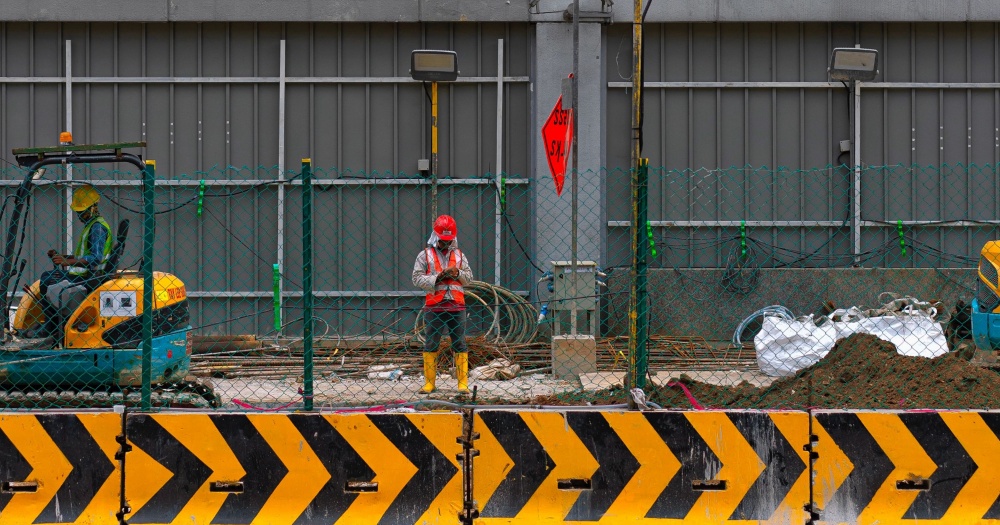Follow us on Telegram for the latest updates: https://t.me/mothershipsg
The Ministry of Manpower (MOM) introduced a "heightened safety" period for companies, which will begin today (Sep. 1, 2022) and last till Feb. 28, 2023.
"Heightened safety" measures
During this six-month period, if serious workplace safety and health lapses are found in a company, MOM may debar them from employing new foreign employees for up to three months.
The chief executive of the company will also have to personally account to MOM and take responsibility for rectification.
Examples of workplace safety and health lapses include unsafe workplace conditions or poor risk controls following serious or fatal workplace accidents.
Companies in high risk sectors, such as in construction and manufacturing, are also required to conduct a mandatory safety time-out (STO) by allocating time to review their safety procedures and complete the STO.
The length of the STO should be "sufficiently long to review risks corresponding to the scale of operations", said MOM in a press release.
These companies must conduct their STO between Sep. 1, 2022 and Sep. 15, 2022.
If a company is found to be non-compliant with the STO, they will be barred from employing new foreign employees for one month.
Tackling rising number of work-related deaths
The "heightened safety" period was introduced with hopes of tackling the recent spate of work-related deaths and injuries.
As of Sep. 1, 2022, 36 workplace fatalities were reported in Singapore, five of which happened in August 2022 alone.
Singapore reported a total of 37 fatalities in the whole of 2021.
Measures targeting the construction sector
According to MOM, the construction sector was the top contributor of workplace fatalities in Singapore in 2022, with a total of 13 deaths thus far.
So from Oct. 1, 2022, MOM will tighten the demerit points system for construction firms in Singapore by lowering the threshold for issuing demerit points.
Currently, companies will be issued demerit points after they get fined four times for workplace safety lapses.
With this tightened measure, demerit points will be given to the firms from their first fine.
On top of the revised demerit point system, all public sector construction tenders will have a new harmonised set of disqualification criteria from Oct. 1.
This, said MOM, will temporarily disqualify contractors with poor workplace safety and health performance from participating in these tenders.
Multi-sectoral workplace safety taskforce
MOM will also be setting up a multi-sectoral workplace safety taskforce which will be chaired by MOM's Senior Minister of State Zaqy Mohamad.
The purpose of the taskforce is to conduct deep dives into work practices and industry structures to strengthen safety practices and outcomes.
The taskforce will tap on ideas and advice from an external experts panel, comprising industry representatives and workplace safety and health consultants.
The government agencies involved in the taskforce will include the Ministry of National Development, Ministry of Transport and the Ministry of Trade and Industry.
Companies recovering from the effects of Covid
Speaking to reporters at a media briefing on Thursday (Sep. 1), Zaqy explained that many sectors are still recovering from the economic effects of Covid-19, and companies are still adjusting to the new work tempo.
However, Zaqy emphasised that workplace safety must not be compromised.
"Companies cannot put safety on the back burner just to catch up on work progress or as they ramp up business activity. So bottomline is that we cannot put our workers' lives at risk, and we have to set our baseline with zero tolerance for fatalities and injuries – this is very important to us."
According to Zaqy, MOM's investigations have shown that many of the recent work-related fatalities could have been prevented with basic precautions, such as work control measures and safe work procedures.
It is also concerning, said Zaqy, that the fatalities have involved experienced workers, including the co-workers around them.
"This indicates, actually, that the root causes are safety lapses and poor risk controls across both large and smaller firms, as well as across sectors," Zaqy added.
Related story
Top image by Oleksii Drozdov via Unsplash.
If you like what you read, follow us on Facebook, Instagram, Twitter and Telegram to get the latest updates.
